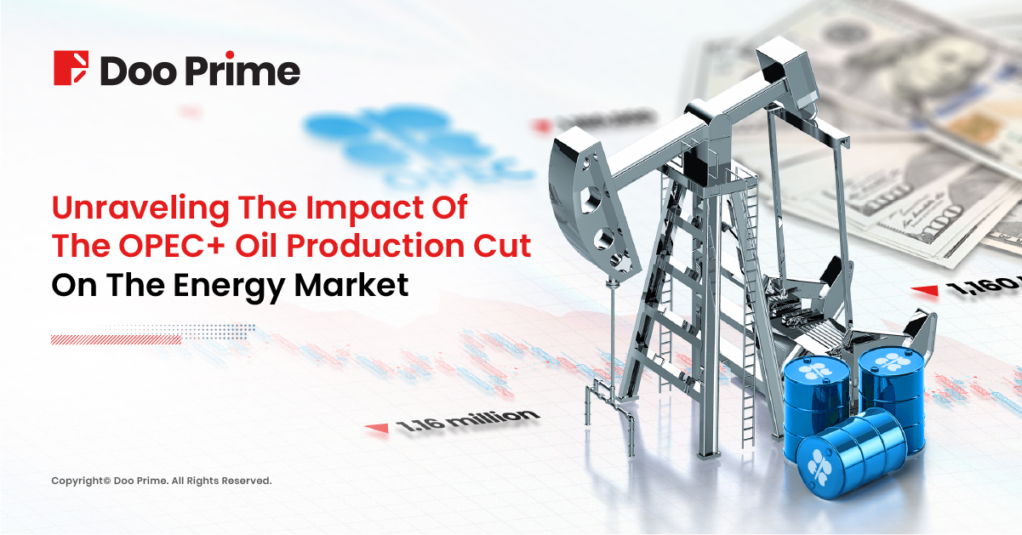
On 2nd April 2023, the Organization of the Petroleum Exporting Countries (OPEC) and its allies, including Russia, announced an oil production cut of 3.66 million barrels per day (bpd) or 3.7% of global demand.
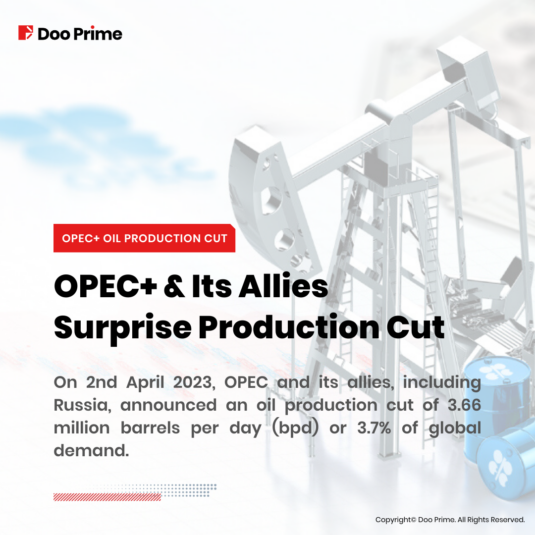
Starting in May and lasting through the end of the year, Saudi Arabia, along with other OPEC+ member countries, will be implementing a “voluntary reduction” in their crude oil production, in addition to the output cuts announced in October 2022.
These earlier cuts entailed a reduction of 2 million barrels a day, the largest since the pandemic’s onset, and equivalent to roughly 2% of the world’s oil demand. The new voluntary reduction will result in Saudi Arabia cutting its oil production by another 500,000 barrels a day, Iraq by 211,000 barrels a day, and the United Arab Emirates by 144,000 barrels per day.
This announcement caught the market off-guard, resulting in an approximate USD 5 increase in oil prices to over USD 85 per barrel.
In this article, we will examine the main reasons behind OPEC+’s move to cut output and the implications it has had on the oil market, including the sharp rise in prices and the potential impact on global inflation and central bank policy.
The Drivers Behind OPEC’s Decision To Cut Oil Production
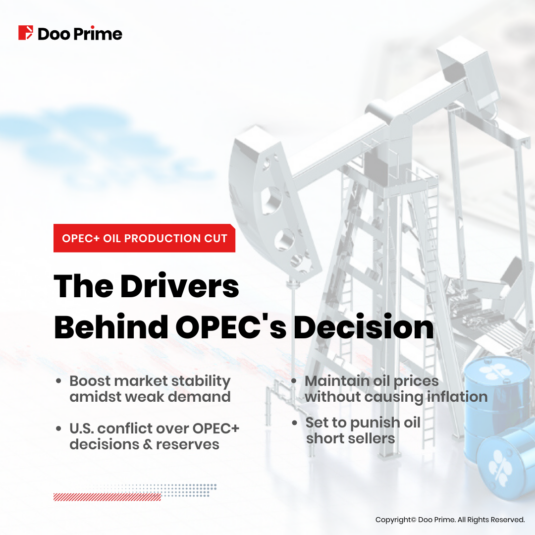
Weak global demand and precautionary measures to support market stability
To support market stability, Saudi Arabia implemented voluntary output cuts of 1.66 million bpd, in addition to the existing 2 million bpd cuts.
Russian Deputy Prime Minister Alexander Novak cited the Western banking crisis and “interference with market dynamics” as reasons for the cut.
Over the past month, fears of another banking crisis have prompted investors to sell out of risk assets, such as commodities, resulting in oil prices plunging from near an all-time high of USD 139 in March 2022 to nearly USD 70 per barrel.
Redburn Research warned that unless OPEC feared a major global recession, the size of the latest cut was probably overdone, and a global recession could lead to lower oil prices.
Set to Punish Oil Short Sellers
This latest oil production cut could have severe consequences for those who bet against rising oil prices, also known as short sellers.
In 2020, Saudi Energy Minister Prince Abdulaziz bin Salman warned traders against taking such a risk, stating that he would work to make the market unstable and that those who gamble on the price of oil would feel the consequences.
Hedge funds had already reduced their net position in U.S. benchmark WTI oil to a mere 56 million barrels by March 21, the lowest since February 2016.
Additionally, their bullish long positions were outnumbered by bearish short positions at a ratio of just 1.39:1, the lowest since August 2016. As one source familiar with OPEC+ thinking put it, “the latest cut would hurt those who bet against oil really badly.”
Strives to Maintain Oil Prices while Avoiding Inflation
According to many analysts, OPEC+ had a target of stabilizing oil prices at USD 80 per barrel, with predictions from UBS and Rystad that prices could even reach USD 100.
However, overly high oil prices pose a risk for the group, as they contribute to inflation and may lead to the development of alternative energy sources.
Additionally, non-OPEC member countries may increase production to take advantage of the high prices.
Goldman Sachs noted that OPEC’s power has increased in recent years due to reduced investments in fossil fuel projects, which has resulted in a slower and smaller response from U.S. shale in reaction to rising oil prices.
Tension With Washington and the Role of U.S. Oil Reserves in OPEC+ Decision-making
The U.S. has been critical of OPEC’s role in manipulating oil prices and its alliance with Russia, especially in light of the ongoing conflict in Ukraine. The U.S. government has even proposed the No Oil Producing and Exporting Cartels Act (NOPEC) legislation, which would allow for the seizure of OPEC’s assets on U.S. soil if collusion is proven.
Meanwhile, OPEC+ has rebuked the International Energy Agency, which it sees as a biased energy watchdog favoring the West, for releasing oil stocks that OPEC+ believes was politically motivated to boost President Joe Biden’s ratings.
Additionally, the U.S.’s decision not to replenish its oil reserves as initially planned in 2023, after already releasing most of its reserves, may have contributed to OPEC+’s move to reduce output, according to JP Morgan and Goldman Sachs.
How Did The Unexpected Production Cut Affect Oil Prices?
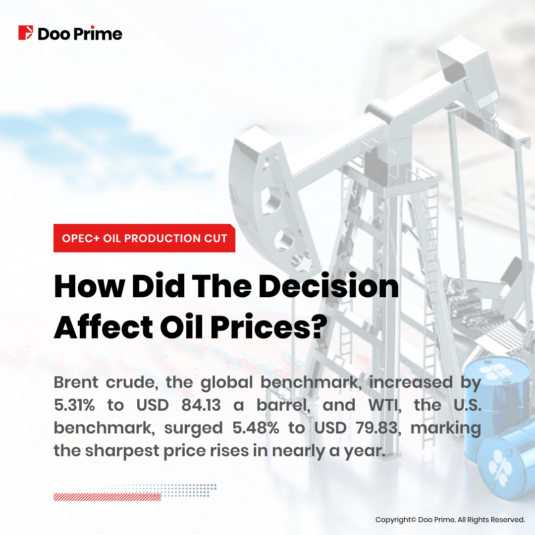
On 3rd April 2023, oil prices surged following the unexpected announcement by Saudi Arabia to start a “voluntary reduction” in its crude oil production.
Brent crude, the global benchmark, increased by 5.31% to USD 84.13 a barrel, and West Texas Intermediate (WTI), the U.S. benchmark, surged 5.48% to USD 79.83, marking the sharpest price rises in nearly a year.
The increase in oil prices is in stark contrast to mid-March when U.S. crude oil prices hit 15-month lows after the collapse of Silicon Valley Bank, causing turmoil in the wider banking sector and raising fears of a global recession.
Although the rebound in oil prices is positive for energy stocks, it may add pressure to inflation, which is a pressing issue for consumers worldwide.
Sophie Lund-Yates, lead equity analyst at Hargreaves Lansdown, commented that “Markets are aware that if the pressure continues, central banks will need to extend or strengthen their interest rate hiking cycles.”
OPEC+ Decision Prompts Increase On Brent Crude Price Forecast
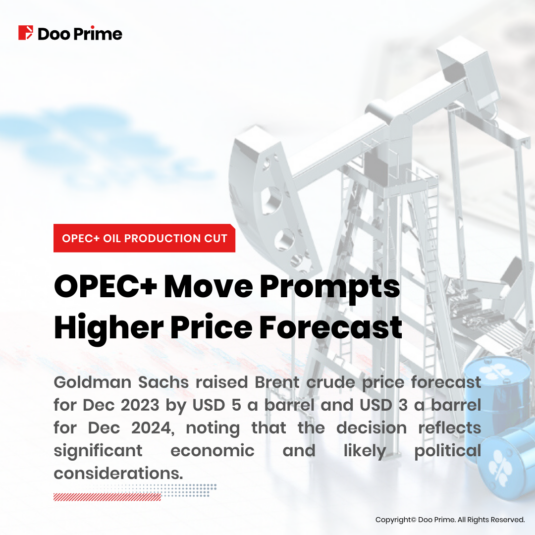
The unexpected announcement by OPEC+ surprised the market, causing Goldman Sachs to raise its price forecast for Brent crude futures.
The bank increased its price forecast for Brent for December 2023 by USD 5 to USD 95 a barrel and by USD 3 to USD 100 a barrel for December 2024. This is despite Goldman Sachs lowering its end-2023 production forecast for OPEC+ by 1.1 million barrels per day.
Goldman Sachs noted that OPEC+’s decision reflects significant economic and likely political considerations, and the output reduction could provide a 7% boost to oil prices, resulting in higher Saudi Arabia and OPEC+ oil revenue.
The bank also suggested that OPEC+’s decision came after the United States and France announced releases from their strategic petroleum reserves, and the refusal to refill the U.S. Strategic Petroleum Reserve in fiscal year 2023, despite previously characterizing WTI lows as sufficient to refill, may have contributed to OPEC+’s decision to cut.
Overall, the unexpected announcement by OPEC+ to cut oil production has caused a sharp rise in crude oil prices, which could add pressure to inflation, a concern for consumers globally.
How OPEC’s Surprise Production Cut Might Impact The Fed’s Efforts To Tackle Inflation
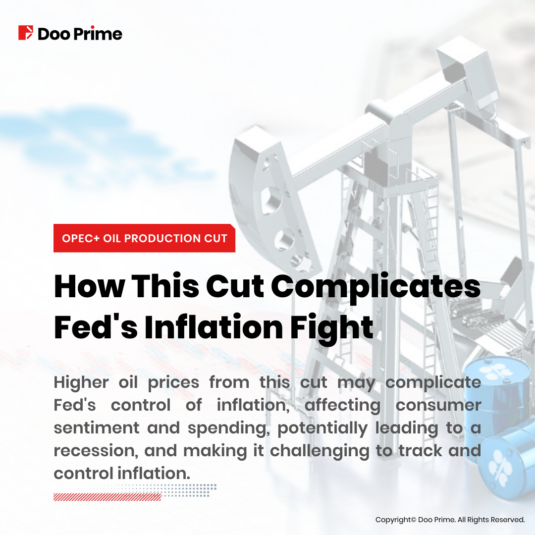
The recent announcement of a surprise production cut by Saudi Arabia and other OPEC+ oil producers may create further complications for the Federal Reserve’s efforts to cool the economy and tame inflation in the United States, according to economists.
The global rise in energy prices due to Russia’s invasion of Ukraine last year exacerbated inflation worldwide just as major economies were beginning to recover from the pandemic.
However, a drop in energy prices helped reduce U.S. inflation, which fell from a 40-year peak of 9.1% in June to 6% in February, according to the Consumer Price Index.
Energy prices, which make up roughly 7.5% of the overall index, were up 5% in February year over year, well below the 41.3% rise last June, according to the Bureau of Labor Statistics.
The surge in oil prices once again may extend the duration of elevated headline inflation in the U.S. or even lead to further increases. Americans are already experiencing higher gas prices, with the national per-gallon average reaching USD 3.55, up from USD 3.40 a month ago.
The Fed primarily focuses on core inflation, which excludes volatile food and energy prices. However, if oil prices remain high for an extended period, they may eventually influence core prices.
Sarah House, a senior economist at Wells Fargo, notes that OPEC decisions, even though considered primarily geopolitical, can affect the production of goods and transportation of other items, making higher oil prices bleed into the core component, which the Fed tends to concentrate on when making policy decisions.
Consumer spending is another critical factor in the equation. Higher energy prices can impact consumer sentiment and reduce consumer spending, which may soften overall demand.
Nonetheless, weaker consumer spending could be a mixed bag in terms of inflation, as it may reduce inflationary pressure for service-providing businesses, but it may also increase the chances of the U.S. slipping into a recession.
James Bullard, the president of the Federal Reserve Bank of St. Louis, acknowledges that higher prices may eventually feed into inflation, complicating the Fed’s job further. He suggests that the volatility of oil prices makes them challenging to track, ultimately leading to more difficulty in the battle against inflation.
Brace For Volatility: Opportunities And Risks For Investors Ahead
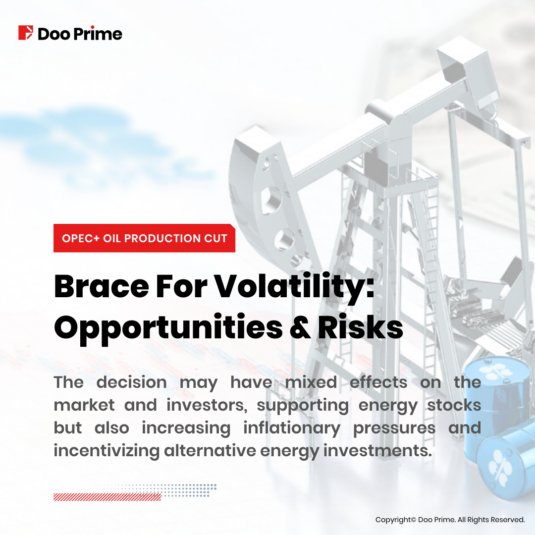
After careful analysis of the potential impacts of OPEC+ decision to cut crude oil production, it is evident that the market and investors should brace themselves for a volatile oil market in the coming months. The decision is expected to have mixed effects on the market and investors. Although it is likely to support energy stocks and penalize oil short sellers, it could also lead to inflationary pressures and encourage investments in alternative energy sources.
The announcement of the production cut has caused a sharp rise in oil prices, with Goldman Sachs revising its price forecasts for crude oil upwards. However, the decision could also extend or strengthen central banks’ interest rate hiking cycles, which could negatively impact consumers. It is therefore crucial for investors to consider the potential spikes and dips in response to a range of factors that could occur in the coming months.
Overall, the decision by OPEC+ to cut crude oil production is likely to have far-reaching implications on the global economy. Investors should closely monitor the developments and make informed decisions based on their risk appetite and investment goals. The oil market’s volatility is expected to persist, and investors should prepare for potential market fluctuations as they position themselves to take advantage of opportunities while minimizing risks.
| About Doo Prime
Our Trading Products
Securities | Futures | Forex | Precious Metals | Commodities | Stock Indices
Doo Prime is an international pre-eminent online broker under Doo Group, which strives to provide professional investors with global CFD trading products in Securities, Futures, Forex, Precious Metals, Commodities, and Stock Indices. At present, Doo Prime is delivering the finest trading experience to more than 90,000 clients, with an average trading volume of more than USD 51.223 billion each month.
Doo Prime entities respectively holds the relevant financial regulatory licenses in Seychelles, Mauritius, and Vanuatu with operation centers in Dallas, Sydney, Singapore, Hong Kong, Dubai, Kuala Lumpur, and other regions.
With robust financial technology infrastructure, well-established partnerships, and an experienced technical team, Doo Prime boasts a safe and secure trading environment, competitive trading costs, as well as deposit and withdrawal methods that support 20+ different currencies. Doo Prime also incorporates 24/7 multilingual customer service and extremely fast trade execution via multiple industry-leading trading terminals such as MT4, MT5, TradingView, and Doo Prime InTrade, covering over 10,000 trading products.
Doo Prime’s vision and mission are to become a financial technology-focused broker, streamlining international global financial products investment.
For more information about Doo Prime, please contact us at:
Phone:
Europe : +44 11 3733 5199
Asia : +852 3704 4241
Asia – Singapore: +65 6011 1415
Asia – China : +86 400 8427 539
E-mail:
Technical Support: [email protected]
Account Manager: [email protected]
Forward-looking Statements
This article contains “forward-looking statements” and may be identified by the use of forward-looking terminology such as “anticipate”, “believe”, “continue”, “could”, “estimate”, “expect”, “hope”, “intend”, “may”, “might”, “plan”, “potential”, “predict”, “should”, or “will”, or other variations thereon or comparable terminology. However, the absence of such terminology does not mean that a statement is not forward-looking. In particular, statements about the expectations, beliefs, plans, objectives, assumptions, future events, or future performance of Doo Prime will be generally assumed as forward-looking statements.
Doo Prime has provided these forward-looking statements based on all current information available to Doo Prime and Doo Prime’s current expectations, assumptions, estimates, and projections. While Doo Prime believes these expectations, assumptions, estimations, and projections are reasonable, these forward-looking statements are only predictions and involve known and unknown risks and uncertainties, many of which are beyond Doo Prime’s control. Such risks and uncertainties may cause results, performance, or achievements materially different from those expressed or implied by the forward-looking statements.
Doo Prime does not provide any representation or warranty on the reliability, accuracy, or completeness of such statements. Doo Prime is not obliged to provide or release any updates or revisions to any forward-looking statements.
Risk Disclosure
Trading in financial instruments involves high risks due to the fluctuation in the value and prices of the underlying financial instruments. Due to the adverse and unpredictable market movements, large losses exceeding the investor’s initial investment could incur within a short period of time. The past performance of a financial instrument is not an indication of its future performance. Investments in certain services should be made on margin or leverage, where relatively small movements in trading prices may have a disproportionately large impact on the client’s investment and client should therefore be prepared to suffer significant losses when using such trading facilities.
Please make sure you read and fully understand the trading risks of the respective financial instrument before engaging in any transaction with Doo Prime’s trading platforms. You should seek independent professional advice if you do not understand any of the risks disclosed by us herein or any risk associated with the trade and investment of financial instruments. Please refer to Doo Prime’s Client Agreement and Risk Disclosure and Acknowledgement Notice to find out more.
Disclaimer
This information is addressed to the general public solely for information purposes and should not be taken as investment advice, recommendation, offer, or solicitation to buy or sell any financial instrument. The information displayed herein has been prepared without any reference or consideration to any particular recipient’s investment objectives or financial situation. Any references to the past performance of a financial instrument, index, or a packaged investment product shall not be taken as a reliable indicator of its future performance. Doo Prime and its holding company, affiliates, subsidiaries, associated companies, partners and their respective employees, make no representation or warranties to the information displayed and shall not be liable for any direct, indirect, special or consequential loss or damages incurred a result of any inaccuracies or incompleteness of the information provided, and any direct or indirect trading risks, profit, or loss arising from any individual’s or client’s investment.